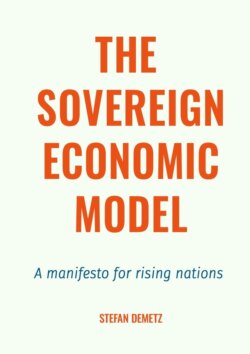Читать книгу The Sovereign Economic Model. A manifesto for rising nations - Stefan Demetz - Страница 23
State capitalism
State Capitalism Investment Models
ОглавлениеA sovereign country should primarily use its economic policies to create the right foundations for business. But it can also use various tools to fund its development. These tools can be funds, SOEs, or agencies.
Sovereign wealth funds are special funds accumulated by a country, usually by oil-rich nations in the Middle East, Norway, and Russia. In most cases these funds are simply intended to optimize returns, that is, to make the most efficient investments anywhere around the globe, and thus operate just like an investor. Sometimes they are mixed. In addition, they invest internally, meaning they finance business in their home country. For example, in Russia, the sovereign wealth fund RDIF invests and co-invests mainly internally. The most prominent example of its investment is the Sputnik V vaccine for COVID-19.
SOEs have historically been tied to energy, i.e., oil and utilities, probably because these industries are critical to state budgets. While in the West these have been mostly or partly privatized, in many countries state-owned utilities are the norm. In developed countries, few state-owned companies exist, while in emerging countries they are common. As a paradox, historically, the biggest growth seems to have happened while the state had a larger ownership of entire industries, both in Europe and in Asia.
The state itself, through its government, can influence business with economic policies, taxation, regulation, and permits. In fully deregulated capitalist countries, the government does not pose many obstacles to business. It even supports the largest companies. Usually the government has to step in if a critical business suffers significant losses or faces bankruptcy. However, in state capitalism, the state heavily regulates some sectors of the economy, owns or controls extensive business, and effectively has a de facto monopoly on strategic industries.
State capitalism allows a country to move a huge amount of resources to implement a plan. The state can move state-owned companies, sovereign funds, and internal funds to support an industry. This combination of finance, labor, and technological skills makes it easier to complete large-scale projects. Imagine a railroad infrastructure upgrade: the state provides financing, a sovereign fund attracts foreign co-investment, state and private companies provide the technology (fast trains, management systems), and state-owned or private construction firms manage the project.
State capitalism has its own mechanism for investment. Investment strategies prioritize long-term improvement of the general economy. Infrastructure, employment, and internal development of industrial and technological market sectors and solutions are investment solutions that spend the money within the country. Comparatively, unbridled capitalism is not about raising the tide to lift all boats, as it is more self-centered and the benefits are restricted to each individual company.
State capitalism is not a silver bullet for all sectors of the economy. These are the areas where state capitalism can best be applied to market sectors:
• Power engineering (electric, nuclear)
• Military-industrial complex
• Banking
• Chemicals (including fertilizers)
• Pharmaceuticals (partial)
• Public utilities
• Mining and metallurgy
• Ports and logistics
• Railways
The telecommunications sector should also be controlled by the state because a telecom network is a fundamental part of the infrastructure for the internet and data transmission. Here, state control of the physical grid network is of paramount importance. Besides promoting state security, it may help domestic companies that produce telecom equipment if such constraints are introduced. Private companies can, together, be minority shareholders of the physical infrastructure. On the business side, they operate as virtual operators and take charge of the service aspect for consumers.
The sovereign economy described in the Sovereign Economic Model also controls the food-distribution system and, consequently, the largest supermarket chains. Such food distribution networks are controlled by the state, but with the participation of all food producers as shareholders and suppliers. In Sweden, alcohol is sold at the retail level only in government-owned retail chains. In other countries, like the UK, Italy, and Switzerland, many cooperatives are running supermarket chains.
On the whole, investment models in state capitalism can provide sound economic progress and in some cases are more dynamic than very large companies. In the best-case scenarios, they are the start of an avalanche, as besides the initial state-backed investment vehicle, academia, SOEs, and even private companies can also get involved.
